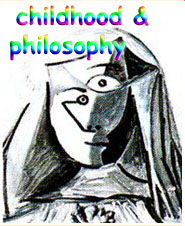peter pan: el líder y sus seguidores. una experiencia de filosofía con niños
DOI:
https://doi.org/10.12957/childphilo.2019.42479Palabras clave:
educación, ética, bullyng, literaturaResumen
La filosofía y la literatura están unidas por fuertes lazos que se evidencian en ambas disciplinas: son muchos los textos literarios y filosóficos en los que se pueden rastrear las influencias recíprocas. En esta experiencia de filosofía con niños se partió de una obra clásica, Peter Pan, para motivar a alumnos de primaria. Los objetivos fueron a) desarrollar el pensamiento crítico y ético a través de la problematización de la vida escolar, b) desarrollar habilidades de análisis, síntesis, inferencia, argumentación, cuestionamiento y pensamiento creativo, c) que los alumnos relacionaran sus experiencias cotidianas con las situaciones que se plantean en la historia. Peter Pan retrata a un tipo de persona muy popular en nuestra época: el líder. Peter es inteligente y simpático, posee la valentía y el carisma suficiente para seducir a los niños perdidos, a los pieles rojas y a Wendy y sus hermanos. Su imaginación y pasión por la aventura lo vuelven aún más atractivo. Peter también encarna defectos que reconocemos en numerosos líderes: vanidad, egoísmo y falta de responsabilidad. Para ejercer el poder cuenta con la sumisión de los niños perdidos. Si en el texto ambas conductas nos parecen naturales, al identificarlas en la vida cotidiana de nuestras escuelas sólo podemos nombrarlas con palabras como bullying, matonismo, agresión, víctimas… Esta experiencia mostró que las obras literarias pueden servir como detonador para la reflexión y el debate, tanto de la vida escolar como de dilemas de la vida cotidiana aportados por los alumnos; permitió el cuestionamiento sobre las relaciones entre pares y la argumentación de sus posturas; también fue posible apreciar las posibilidades que abre tener un espacio para potenciar la imaginación. En el caso de los docentes, pudieron conocer y comprobar la función problematizadora de las preguntas, aunque sólo algunos aprendieron a formularlas. Una escasa formación en pensamiento crítico disminuye su capacidad para implementar estrategias que contribuyan al desarrollo de las habilidades mencionadas.
Descargas
Citas
Agratti, L.V. (2016) “La práctica de la filosofía en la educación y el propósito de que cada vez sean más los que se representen el mundo como propio”. En: Kohan, W.O., Lopes S. y Martins, F. (orgs.) O ato de educar em uma língua ainda por ser escrita, Rio de Janeiro: Nefi.
Álvarez, J.P (2015) “No hay quien pueda pensar por otro”. Entrevista a Walter O. Kohan. En: J. E. Pérez, J.P. Álvarez y C. Guerra Eds.), Hacer filosofía con niños y niñas. Entre educación y filosofía. Valparaíso: Universidad de Valparaíso.
Barrie, J, M. (2002). Peter Pan. Barcelona, España: José J. de Olañeta. Ed.
Charabati, E. (2006). Los amigos de Peter Pan. México: Fundación para la Educación Colegio Hebreo Maguén David.
Defrance, B. (2005): Disciplina en la escuela, España, Ed. Morata.
Hawken, J. (2016). Philosopher avec les enfants : enquête théorique et expérimentale sur une pratique de l’ouverture d’esprit [Filosofar con los niños: encuesta teórica y experimental sobre una práctica e la apertura de espíritu] (Tesis doctoral). Paris: Université Panthéon-Sorbonne, Paris.
Kohlberg, L., Power, F. y Higgins, A. (1997). La educación moral. España: Gedisa.
Lipman, M, Sharp, A.M. y Oscayan, F.S. (1992). La filosofía en el aula. Madrid: Ediciones de la Torre.
Maulini, Olivier (1998). “La question: un universel mal partagé”, en: Educateur, n°7, p.13-20. Recuperado de https://archive-ouverte.unige.ch/unige:35542.
Maulini, O. (2005). Questionner pour enseigner & pour apprendre. Le rapport au savoir dans la classe. Paris: ESF.
Skliar, C. (2017). Pedagogías de las diferencias. Bs. AS: Noveduc.
Tozzi, M. (1999). Apprendre a philosopher au cours de morale, Bruxelles: Entre-vues.
Tozzi, M. (2008). Pensar por sí mismo: iniciación a la pedagogía de la filosofía. Madrid: Editorial Popular.
Descargas
Publicado
Cómo citar
Número
Sección
Licencia
el copyright de cada artículo pertenece a cada autor. childhood & philosophy tiene el derecho a la primera publicación. el permiso de reimprimir cualquier artículo que haya aparecido en la revista necesita de la autorización escrita del autor. en adisión a cualquier forma de reconocimiento requerido por el autor el siguiente aviso debe ser añadido a la declaración de permiso en la reimpresión (con los números apropiados a los puntos suspensivos): [título del artículo] fue publicado originalmente en la infancia y la filosofía, tomo ..., número ..., pp. ...-...




